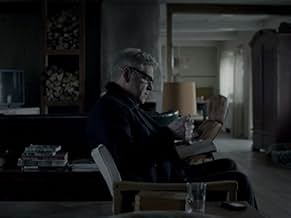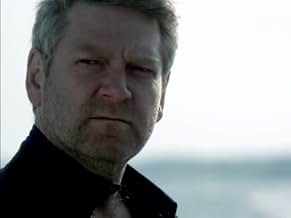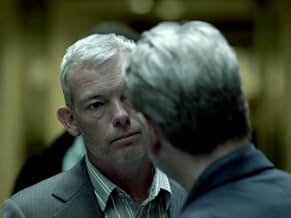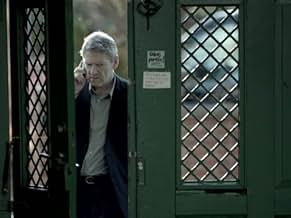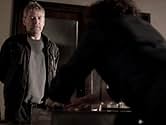Um programa de televisão centrado em um policial sueco que busca a alma.Um programa de televisão centrado em um policial sueco que busca a alma.Um programa de televisão centrado em um policial sueco que busca a alma.
- Indicado para 2 Primetime Emmys
- 12 vitórias e 31 indicações no total
Explorar episódios
Avaliações em destaque
Detective Kurt Wallander, a man in perpetual need of a shave and a healthy meal is a noir-by-day modern gumshoe fighting for justice. His dedication has cost him. His wife left him after finding out he's already married to his work. His daughter is an earnest and dutiful supporter of the detective, but oblivious to the evil his eyes see daily. Not sure how he's doing it, but Kenneth Branagh OWNS this role and he's *really* appealing as this frayed-at-the-edges public servant. Shot like a mini-series, or a movie for TV, I admit I am impressed with his ability to flex into this role that is so utterly unlike his Shakespeare work. Frankly, he acts circles around the other cast members. A must-see for the mildest Branagh fan and good enough for any mystery/detective story lover. FYI: Disc 1 has two episodes. Disc 2 has one episode and special features that has spoilers if you don't see the other shows first. I was disappointed that I saw the 3rd episode before the first two. I understand there are 3 more episodes ordered for 2010. 07/09
The other thing is that Kenneth Branagh is an international star, thus his Wallander is more distinguishing and less team player: his colleagues have less importance and less time on screen than in the Swedish version. Branagh's Wallander is also more unsociable and seems more depressed, underlined by long scenes focusing on his face expression under driving or walking. The big plus is that the Brits have tried to create the Swedish atmosphere as much as possible, signs are in Swedish etc. Well, the UK and Sweden have same latitudes, so the filming of Swedish nature was also possible in England.
Nevertheless, if you like Scandinavian crime thrillers (with slower pace, minimum explosions/chases, long nature frames), then the Wallander series is definitely for you. However, the "trinity" series is better to watch in a temporal sequence, they have some references to earlier events.
Nevertheless, if you like Scandinavian crime thrillers (with slower pace, minimum explosions/chases, long nature frames), then the Wallander series is definitely for you. However, the "trinity" series is better to watch in a temporal sequence, they have some references to earlier events.
Both the first series of Swedish TV's Wallander and the second collection of British TV's interpretations have recently been aired on British TV, and whilstthey share a number of elements and qualities (locations, excellent filmatography, thoughtful and impressive 'takes' on the central figure of Kurt Wallander), it's the differences that seem to separate a good television drama from an outstanding one.
Obviously the two productions differ in a number of basic ways and it's worth highlighting these as a given. For the most part Swedish Wallander uses Mankel's stories as inspiration, creating unique plots per episode, whilst British Wallander uses the source material and thus far has for the most part faithfully adapted 6 of Mankel's books (interestingly the choice has been to adapt out of sequence, although the original stories were also published out of sequence, in Britian at least). An exception is the depiction of Kurt's father and his struggle with dementia, which logically has to progress through the overall TV series.
A second key difference is the interpretation of Kurt Wallander's relationship with his daughter. Swedish TV puts Linda into the police force from the outset, and uses this device to explore their legendary troubled relationship with the added frisson of professional, hierarchical tensions. Also into the mix is the relationship between Linda and her colleague Stefan Lindman. British Wallander maintains the original Linda/Kurt story arc, with Linda not yet having enrolled for police duty.
A third difference is the inclusion/exclusion of the Ann-Britt Höglund character. It seems the Swedish version quickly came to view this character as unnecessary within the looser story structure, as she is dispensed with well before Series One concludes. For British TV Höglund remains integral, just as she is in the books.
However, setting aside these givens, there are a number of factors which set the two interpretations apart in terms of quality, success and viewer experience. British Wallander is quite pacey, moving the story along briskly from scene to scene. Whilst this mostly works, it does occasionally occur at the expense of scene and/or character development - the camera (and therefore the viewer) is forced to follow Kurt, leaving other characters as cyphers. This is most notable during scenes with colleagues at police HQ. Swedish Wallander adopts a slower style, allowing characters and stories to develop and unfold with greater subtlety. This approach leads to a second and quite fundamental difference, and it is this element that underlines the superiority of the Swedish Wallander. The combination of writing, direction and editing for a slower pace allows the Swedish actors to effectively 'do less' and achieve more. Accordingly, Henricksson, Bergman, Sällström, Rapace et al are repeatedly given the time and direction to use economy and skill to enable the viewer to understand what they are thinking, feeling etc. The final episode of Series One was a particular example of this, with all concerned but particularly Sällström and Henricksson underplaying beautifully to create scenes of desperate sadness, bewilderment and loss whilst actually 'doing' very little. In comparison, a combination of misjudged casting and actors being let down by script and scene construction in the British version means for the most part the viewer receives less reward. Branagh, Warner and most notably McCabe as Nyberg are the exceptions, the former not least because Wallander remains the prime focus through the British drama, and is therefore given more time, scene-by-scene, and Warner because he is quite simply an experienced and clever film actor. Yet it is McCabe who shines, underplaying beautifully, especially during scenes in Episode 4 - The Faceless Killers.
Views on casting are always contentious. Suffice to say, the Swedish series has somehow managed to secure a host of clever actors who know a thing or two about camera work, and particularly scenes in close-up. From the moments of occasional humour gratefully received from Mörck's Ebba and Gunnarsson's Svartman (an incidental and unsung masterpiece of a performance) to the brilliance of Henricksson and Sällström, it's the Swedish production which holds the treats and subtleties and warrants repeat viewings.
The British Wallander is indeed watchable, but let's hope the BBC transmits Series 2 of the Swedish production as soon as possible, and let's also hope the absence of Rapace and Sällström doesn't diminish what has been an excellent television production.
Obviously the two productions differ in a number of basic ways and it's worth highlighting these as a given. For the most part Swedish Wallander uses Mankel's stories as inspiration, creating unique plots per episode, whilst British Wallander uses the source material and thus far has for the most part faithfully adapted 6 of Mankel's books (interestingly the choice has been to adapt out of sequence, although the original stories were also published out of sequence, in Britian at least). An exception is the depiction of Kurt's father and his struggle with dementia, which logically has to progress through the overall TV series.
A second key difference is the interpretation of Kurt Wallander's relationship with his daughter. Swedish TV puts Linda into the police force from the outset, and uses this device to explore their legendary troubled relationship with the added frisson of professional, hierarchical tensions. Also into the mix is the relationship between Linda and her colleague Stefan Lindman. British Wallander maintains the original Linda/Kurt story arc, with Linda not yet having enrolled for police duty.
A third difference is the inclusion/exclusion of the Ann-Britt Höglund character. It seems the Swedish version quickly came to view this character as unnecessary within the looser story structure, as she is dispensed with well before Series One concludes. For British TV Höglund remains integral, just as she is in the books.
However, setting aside these givens, there are a number of factors which set the two interpretations apart in terms of quality, success and viewer experience. British Wallander is quite pacey, moving the story along briskly from scene to scene. Whilst this mostly works, it does occasionally occur at the expense of scene and/or character development - the camera (and therefore the viewer) is forced to follow Kurt, leaving other characters as cyphers. This is most notable during scenes with colleagues at police HQ. Swedish Wallander adopts a slower style, allowing characters and stories to develop and unfold with greater subtlety. This approach leads to a second and quite fundamental difference, and it is this element that underlines the superiority of the Swedish Wallander. The combination of writing, direction and editing for a slower pace allows the Swedish actors to effectively 'do less' and achieve more. Accordingly, Henricksson, Bergman, Sällström, Rapace et al are repeatedly given the time and direction to use economy and skill to enable the viewer to understand what they are thinking, feeling etc. The final episode of Series One was a particular example of this, with all concerned but particularly Sällström and Henricksson underplaying beautifully to create scenes of desperate sadness, bewilderment and loss whilst actually 'doing' very little. In comparison, a combination of misjudged casting and actors being let down by script and scene construction in the British version means for the most part the viewer receives less reward. Branagh, Warner and most notably McCabe as Nyberg are the exceptions, the former not least because Wallander remains the prime focus through the British drama, and is therefore given more time, scene-by-scene, and Warner because he is quite simply an experienced and clever film actor. Yet it is McCabe who shines, underplaying beautifully, especially during scenes in Episode 4 - The Faceless Killers.
Views on casting are always contentious. Suffice to say, the Swedish series has somehow managed to secure a host of clever actors who know a thing or two about camera work, and particularly scenes in close-up. From the moments of occasional humour gratefully received from Mörck's Ebba and Gunnarsson's Svartman (an incidental and unsung masterpiece of a performance) to the brilliance of Henricksson and Sällström, it's the Swedish production which holds the treats and subtleties and warrants repeat viewings.
The British Wallander is indeed watchable, but let's hope the BBC transmits Series 2 of the Swedish production as soon as possible, and let's also hope the absence of Rapace and Sällström doesn't diminish what has been an excellent television production.
While it does have its slow moments, and one or two plots may have moments that are hard to keep up. Regardless of how inferior it is or not to the 2005 series which is admittedly absolutely brilliant, this is still extremely good and any other flaws if any are compensated by the quality of how the series is made, constructed and acted. For instance, the Swedish setting is truly evocative and very often stunning. The music is haunting too, while the writing is of really good quality and the stories in general very well written. And then we have Kenneth Branagh, who I think is a great actor and more than decent director, especially in Shakespeare. He is brilliant as the dour and world-weary Kurt Wallander, and Sarah Smart, Jeany Spark, Rixhard McCabe and David Warner solidly support him. Overall, this is a well done television series. 9/10 Bethany Cox
I usually enjoy British-made mystery series, and "Wallander," starring Kenneth Brannaugh, is one of the recent series that particularly stands out.
Based on the mystery novels by Henning Mankell, "Wallander" maintains the Swedish setting of the novels, and the slightly moody tone of the books. Wallander is a complex character with many foibles, but he remains sympathetic, and Brannaugh's portrayal is spot-on. The relationship of the title character with his daughter and his colleagues rings true both to life and to the original novels.
As to another reviewer thinking it's odd that they're speaking English when it's set in Sweden, unless it's being dubbed from English into another language (particularly Swedish), I would find nothing odd about it. I wouldn't expect a British series to be written in Swedish, regardless of the setting or the original source. No more did I expect "The Last Emperor" to be filmed in Chinese or the characters in "I, Claudius" to be speaking Latin. The Swedish setting is highly evocative, and the series is true to the spirit of the books.
I highly recommend "Wallander" for anyone who likes character-driven detective mysteries. (ETA: BTW, anyone who has a chance to see the original Swedish "Wallander" series, it is somewhat different, the drama more implied through the circumstances of the particular crimes, and is more subdued; there's also more of a "police procedural" feel to it. They're sometimes shown on U.S. television w/ English subtitles. I don't know if it's available dubbed or not -- but as I prefer not to watch things that are dubbed even when I don't speak the language, I'm very glad to say that I'm only acquainted with the subtitled version. I'd say that the Swedish version picks up more the plot and action of the books, whereas the British version is more interested in the characters, particularly Wallander, but also the characters and motivation of the perpetrators.)
Based on the mystery novels by Henning Mankell, "Wallander" maintains the Swedish setting of the novels, and the slightly moody tone of the books. Wallander is a complex character with many foibles, but he remains sympathetic, and Brannaugh's portrayal is spot-on. The relationship of the title character with his daughter and his colleagues rings true both to life and to the original novels.
As to another reviewer thinking it's odd that they're speaking English when it's set in Sweden, unless it's being dubbed from English into another language (particularly Swedish), I would find nothing odd about it. I wouldn't expect a British series to be written in Swedish, regardless of the setting or the original source. No more did I expect "The Last Emperor" to be filmed in Chinese or the characters in "I, Claudius" to be speaking Latin. The Swedish setting is highly evocative, and the series is true to the spirit of the books.
I highly recommend "Wallander" for anyone who likes character-driven detective mysteries. (ETA: BTW, anyone who has a chance to see the original Swedish "Wallander" series, it is somewhat different, the drama more implied through the circumstances of the particular crimes, and is more subdued; there's also more of a "police procedural" feel to it. They're sometimes shown on U.S. television w/ English subtitles. I don't know if it's available dubbed or not -- but as I prefer not to watch things that are dubbed even when I don't speak the language, I'm very glad to say that I'm only acquainted with the subtitled version. I'd say that the Swedish version picks up more the plot and action of the books, whereas the British version is more interested in the characters, particularly Wallander, but also the characters and motivation of the perpetrators.)
Você sabia?
- CuriosidadesMost Swedish critics consider this the best movie or television adaptation of the Wallander canon, in particular because of Sir Kenneth Branagh's performance. The most prominent newspaper in southern Sweden (where the series was set and filmed) acknowledged this with an article whose title translates as "Wåll-and-ör- The Real Wallander" (the first part pokes fun at the way Wallander's name is pronounced in English).
- ConexõesFeatured in Breakfast: Episode dated 7 June 2010 (2010)
Principais escolhas
Faça login para avaliar e ver a lista de recomendações personalizadas
- How many seasons does Wallander have?Fornecido pela Alexa
Detalhes
Contribua para esta página
Sugerir uma alteração ou adicionar conteúdo ausente








